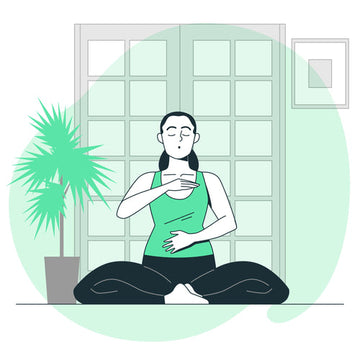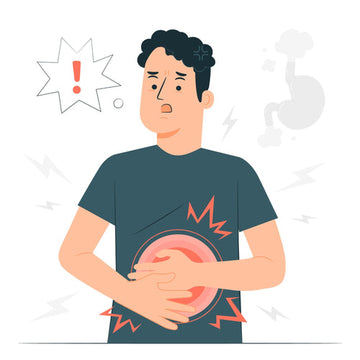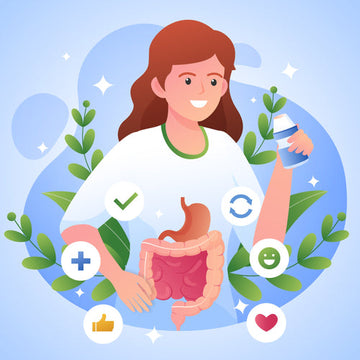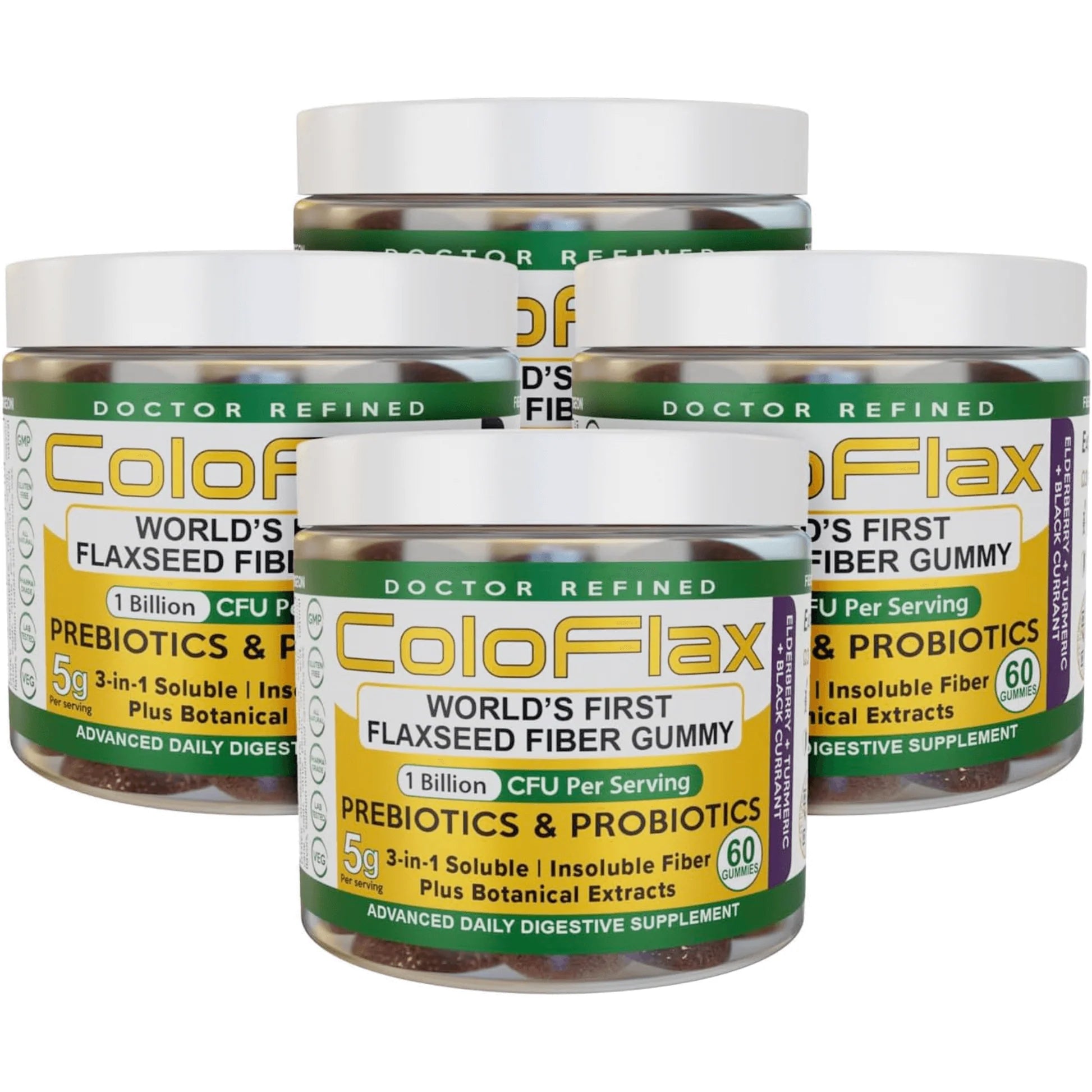95% of Americans don’t eat enough fiber, even though adequate fiber intake has been linked to a host of health benefits.
It’s a topic we have discussed several times before on this blog and one that may appear again. We’ve talked about the benefits of eating more fiber and have also highlighted the benefits of prebiotic fiber.
But what happens if you consistently fall short of those fiber DVs? What happens to your body if you barely eat any fiber?
Let’s take a look.
1. You May Experience Weight Gain

Do you find that you’re constantly hungry no matter how much you eat? Do the pangs of hunger strike just an hour or so after eating a big meal?
A lack of fiber could be the cause.
One of the benefits of eating fiber is that it passes slowly through your digestive tract, thus making you feel fuller for longer.
Fiber, and soluble fiber in particular, dissolves in water and forms a gel-like substance. This increases the volume in your stomach and then moves slowly through your system, grabbing other waste and forming large stools.
If you have ever used a soluble fiber supplement like psyllium husk, you’ll have a fair idea of how this works. Psyllium is just a type of soluble fiber, so it has much the same effect as high-fiber foods.
If you’re not as hungry, you eat less, and if you eat less, you gain less weight.
We often dismiss weight gain as something that’s outside our control while treating weight loss as some kind of unachievable goal that requires a magic bullet. It’s the reason so many people give up on their weight-loss journeys and it’s why billions are spent on new diet fads, foods, and weight-loss programs every year.
But assuming you don’t have a metabolic issue, weight gain/loss is a simple equation of calories in vs calories out. Exercise burns calories and thus helps with the “calories out” part of that equation. But the easiest way to lose weight is to control the “calories in”.
By eating foods that fill you up and put a stop to snacking and overeating, you can reach your weight loss goals.
2. You Constantly Have Digestive Problems

Digestive problems can be caused by an array of conditions—some serious, most harmless. But the most common cause of frequent constipation, bloating, gas, and general digestive discomfort is a lack of fiber.
It is recommended that you consume between 25 and 30 grams of fiber a day, and yet most of us consume less than 15g. In fact, a study conducted a few years ago found that around 95% of Americans aren’t getting enough fiber. For many of those, 15g will be sufficient, and as long as they get exercise and drink plenty of water, they may not experience any issues. (1)
But if you’re falling far short of that 25 to 30g recommendation, or there are other mitigating factors (opioid use, suboptimal water intake, a sedentary lifestyle) you may be in a perpetual state of constipation and gastric distress.
It’s normal to feel a little discomfort every now and then and most people will suffer from at least one incidence of both constipation and diarrhea over the course of a year. But if you find that you’re constantly reaching for the laxatives and can’t seem to keep your gut health in check, it’s time to reassess your diet.
A lack of fiber could also be the cause of incomplete bowel movements, where it feels like you haven’t had a full movement.
It can cause dry and hard stools as well, and if you’re passing these on a regular basis, you’re at risk of bleeding and general discomfort.
3. Your Cholesterol Levels Are High

A number of studies have found a direct association between increased fiber intake and improved cardiovascular health, suggesting that eating an adequate amount of fiber could support heart health. (2)
That’s not to say that eating more fiber will protect you against high cholesterol, but it could play both a direct and indirect role.
Firstly, soluble fiber helps to bind with cholesterol particles in your digestive system and stops them from being absorbed into the bloodstream.
Secondly, if you’re eating your fill of fiber, you’re much less likely to be hungry throughout the day and won’t resort to eating as many fatty and starchy foods, consumption of which could increase your risk of heart disease.
The weight management effects could also be beneficial for your cardiovascular health. According to a study conducted in the United Kingdom, being obese increases your risk of coronary heart disease by up to 28%, and every pound that takes you closer to your “ideal” weight will reduce that risk. (3)
4. Your Energy Levels are Low

A high-fiber diet can support blood sugar levels and keep your energy stable throughout the day. Not only does fiber slow down digestion and provide some stability, but it means your energy levels are not sharply rising and falling as a result of starchy and sugary foods.
For this reason, high-fiber diets are often recommended for people struggling with diabetes. (4)
A study conducted in 2021 found that natural fiber and fiber supplements were “effective in improving glycemic control and insulin sensitivity” in patients with type-2 diabetes.
What’s more, if you’re bloated and constipated, you won’t feel like moving around and your energy levels may be sapped.
Of course, there are many reasons why you might be struggling with low energy, including lack of sleep, medication side effects, low carbohydrate intake, and depression. But fiber plays a significant role.
5. You Have Brain Fog and Trouble Sleeping

Low energy, constipation, and digestive discomfort can all lead to brain fog. And if you’re battling brain fog, bloating, and gas, you may be struggling to sleep, thus compounding the issue.
You are what you eat, as the saying goes, and if you’re limiting your fiber intake and consuming a lot of saturated fat and low-quality carbs, it could affect you in many areas.
6. You Have Bad Skin

Fiber supports a healthy gut microbiome, which in turn benefits your skin. It could make your skin noticeably healthier while assisting with conditions such as acne.
It’s not just the fiber that helps, either. Many great sources of fiber are also high in antioxidants that can help with skin, hair, nail, and even eye health.
Is a Low-Fiber Diet Dangerous?

Fiber is an important part of a balanced diet and diet plays a major role in overall health and well-being. We often dismiss many chronic diseases as being “bad luck”. It’s something you either get or don’t get—what you eat, drink, and do is immaterial.
But diet and lifestyle are the biggest contributing factors to a host of chronic diseases. We know, for instance, that smoking and heavy drinking will greatly increase your risk of chronic heart disease, as well as lung and liver problems. The alarms have also been raised regarding the consumption of trans fats, saturated fats, salt, and refined sugar.
And that’s before you consider the damage that can be caused by nutrient deficiencies.
Fiber won’t fix all of these, but it’s still an important part of a balanced diet.
This is especially true if you get your fiber from natural sources, as most of them are loaded with other nutrients. Seeds, oats, legumes, beans, fruit, vegetables, salad leaves—these are some of the healthiest things that you can eat and they are all high in fiber.
What is the Easiest Way to Get More Fiber?

Let’s be honest, you probably know that you need to eat more fiber. You might not know how much more or why it’s so important, but we all know that fiber is important, and if you pay attention to your bowel habits, you’ll know if you’re getting enough or not.
But acknowledging the fact that you’re deficient and actually doing something about it are two different things.
There are several reasons that people don’t eat enough fiber.
The first is that they mistakenly believe fiber will give them gas and diarrhea. In actual fact, eating lots of soluble fiber has more of a bulking effect on your stools and will make for cleaner, healthier, and more comfortable bowel movements. As long as you eat a balance of soluble and insoluble fiber, you shouldn’t have any issues in that regard.
The second reason is that high-fiber foods aren’t always as appetizing as low-fiber options.
After all, there’s no fiber in meat, fish, or cheese, and you won’t find much in pizza, burgers, French fries, and other popular foods either.
This is easily rectified, though. Just find a high-fiber food that you enjoy and add it to as many meals as you can. Beans, legumes, seeds, oats, vegetables, and fruit are all great sources of fiber.
You can also pick up a high-quality fiber supplement like ColoFlax, which contains a blend of soluble and insoluble fiber, as well as prebiotics, probiotics, omega-3 fatty acids, and botanical extracts.
Finally, people are worried that eating too much fiber will make them bloated and gassy. This can happen, but only if you’re used to eating very little fiber and suddenly start consuming huge quantities.
It takes your body some time to get used to the change, so you may feel a little uncomfortable and gassy for the first few days.
If that’s what you’re worried about, just take it easy and increase your fiber intake steadily. Every little helps, so if you’re used to eating nothing but bread, meat, and fast food, start with a bowl of high-fiber cereal or a meal that contains a few servings of vegetables.
You’ll notice the effects right away, and after a few days, you can start incorporating more fiber into your diet. If you do it gradually like this, you shouldn’t experience anything more than a few minor gastrointestinal issues. After a few weeks, your digestive health will be better than ever.
Summary: The Side Effects of Not Eating Enough Fiber
Fiber is an often neglected food group that 95% of us need to pay more attention to. It won’t aid with muscle growth like protein and it won’t fuel your muscles like carbohydrates, but it has an indirect effect on everything from your cardiovascular health and skin to your waistline.
If you need some more tips on getting your fill of fiber, check out this guide to fast-food fiber options or this one on the best high-fiber meals that you can eat. And don’t forget to pick up a bottle of ColoFlax, the daily fiber gummy formulated with optimal digestive health in mind.






